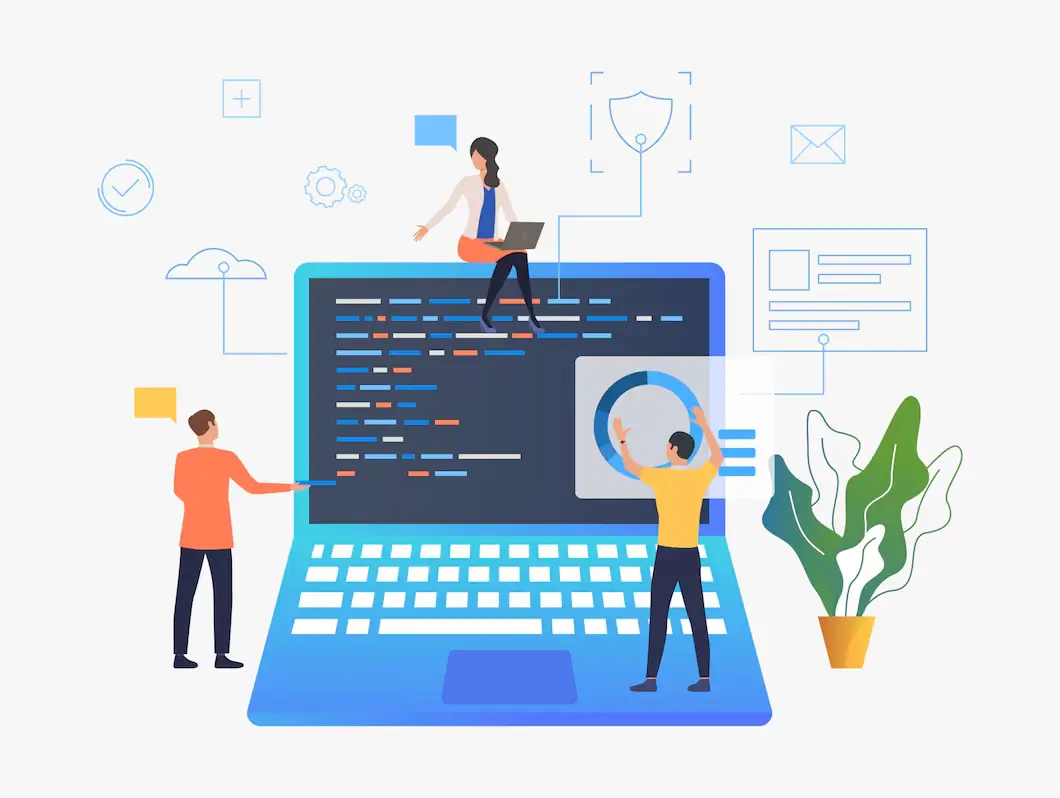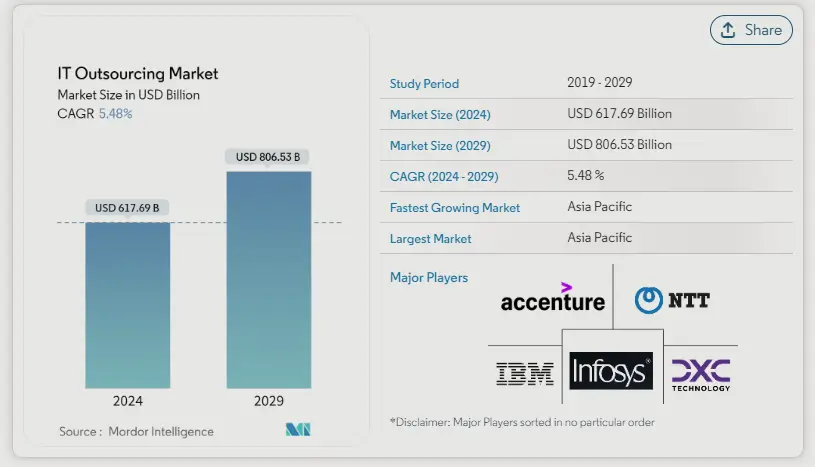Hiring top-tier software development engineers (SDEs) can make a critical difference in the success of any tech project. Whether building an in-house team or outsourcing talent, having a well-defined hiring process is essential. This guide explores key qualities to look for in engineers, the hiring process, and strategic insights to help you secure top talent.
1. The Increasing Demand for Skilled Software Engineers
The demand for custom software development engineers has skyrocketed in the last decade. With industries embracing digital transformation, software solutions play a central role in operational efficiency and innovation. As a result, skilled engineers are in high demand. The IT Outsourcing Market, valued at over $500 billion, is projected to grow significantly through 2027, according to Mordor Intelligence. Many businesses choose to outsource software development due to the shortage of in-house talent and the complexity of cutting-edge technologies.
Given this high demand, businesses need to adopt best practices in identifying and hiring the right talent.
- IT Outsourcing Market

- IT Outsourcing Market Analysis :- The IT Outsourcing Market size is estimated at USD 617.69 billion in 2024, and is expected to reach USD 806.53 billion by 2029, growing at a CAGR of 5.48% during the forecast period (2024-2029) Source – https://www.mordorintelligence.com/industry-reports/it-outsourcing-market)
2. Key Qualities to Look for in a Software Development Engineer
When hiring software engineers, evaluating more than just technical skills is crucial. Here are the key qualities you should prioritize:
- Technical Proficiency and Versatility
The foundation of a software engineer’s capabilities is their technical proficiency. Engineers should have an in-depth understanding of programming languages, tools, and frameworks relevant to your project (e.g., Python, JavaScript, React, etc.). However, it’s not just about knowing the technology; it’s about being versatile enough to adapt to new tools as the project evolves. - Problem-Solving Skills
Problem-solving is an essential trait. Engineers face complex challenges daily, and how they approach solving these issues defines their value. A successful engineer will break down problems, propose multiple solutions, and understand the trade-offs of each decision. - Teamwork and Communication
Software development is rarely a solo effort. Engineers must collaborate with other team members, including designers, product managers, and stakeholders. Great engineers know how to communicate technical concepts in non-technical terms and work harmoniously within a team environment. - Passion for Learning
Technology evolves rapidly. Engineers who are passionate about learning new skills and staying up-to-date with the latest trends in development (e.g., cloud computing, artificial intelligence) are better suited to tackle modern development challenges. Look for engineers who show a commitment to continuous learning, whether through side projects, certifications, or contributions to open-source projects. - Adaptability and Agility
Projects often change direction or face unforeseen challenges. An engineer’s ability to adapt to new requirements, processes, or even shifts in technology stacks is critical. An agile mindset allows for rapid iteration and better problem resolution. - Attention to Detail
Software bugs can have major impacts on performance and security. Top engineers demonstrate exceptional attention to detail, ensuring their code is well-written, optimized, and thoroughly tested. While speed is often desired, quality control cannot be sacrificed. - Cultural Fit and Values Alignment
Beyond skills, consider the cultural fit. Engineers who align with your company’s values and work culture will be more engaged, perform better, and stay longer. During interviews, discuss topics like work ethics, time management, and alignment with the company’s mission.
3. Best Practices for Hiring Software Engineers
Hiring top-tier software development engineers (SDEs) can make a critical difference in the success of any tech project. Whether building an in-house team or outsourcing talent, having a well-defined hiring process is essential. This guide explores key qualities to look for in engineers, the hiring process, and strategic insights to help you secure top talent.
- 1. Craft a Clear Job Description
A clear, detailed job description is the first step. Outline the required technical skills, responsibilities, and experience level. Ensure that the job description reflects the project’s needs and the desired qualities. - 2. Implement Rigorous Technical Assessments
Coding tests, pair programming exercises, or take-home projects help assess a candidate’s problem-solving abilities and their approach to writing clean, efficient code. Tools like HackerRank or LeetCode are valuable for conducting online assessments. - 3. Evaluate Soft Skills During Interviews
Beyond technical interviews, assess a candidate’s communication, collaboration, and conflict-resolution abilities. This can be done through behavioral interviews, where you ask questions about past experiences and teamwork. - 4. Build a Diverse Talent Pipeline
Encourage diversity and inclusion by sourcing talent from various backgrounds, universities, and professional experiences. Studies have shown that diverse teams outperform homogeneous ones in problem-solving and innovation. - 5. Focus on Employer Branding
A strong employer brand can attract top talent. Showcase your company’s culture, employee growth opportunities, and innovative projects. An excellent way to do this is through your company’s career page, social media, and employee testimonials. - 6. Consider Outsourcing as a Strategic Option
If local talent is limited or cost is a concern, IT outsourcing is an excellent alternative. According to Mordor Intelligence, companies increasingly turn to outsourcing as a strategic option for software development due to its flexibility, cost-effectiveness, and access to global talent pools. Outsourcing allows companies to scale projects rapidly, mitigate risks, and focus on core business functions. - 7. Foster a Strong Onboarding Process
Once hired, a comprehensive onboarding process is key to integrating new engineers into your team. Provide them with the necessary resources, mentorship, and clear expectations so they can hit the ground running.

4. Avoiding Common Pitfalls in the Hiring Process
Even with a solid hiring process, certain pitfalls can derail your efforts:
- Hiring Based Solely on Technical Skills
While technical skills are essential, hiring based purely on them may overlook crucial soft skills like communication and teamwork. Balance your assessment to include both aspects. - Not Investing in the Interview Process
A rushed interview process can lead to poor hires. Take the time to evaluate candidates thoroughly. Multiple rounds of interviews focusing on different aspects of the role can help you get a holistic view of the candidate. - Neglecting Post-Hire Engagement
The hiring process doesn’t end when a candidate is onboarded. Continuous engagement through mentorship, feedback, and professional development opportunities helps retain top talent and improves overall job satisfaction.
Final Thoughts
Hiring the right software development engineers requires a mix of technical assessment, cultural alignment, and strategic foresight. By focusing on the key qualities and best practices mentioned in this guide, you can enhance your hiring process and secure top-tier talent that drives innovation and growth in your organization.
Outsourcing remains a viable strategy for companies facing local talent shortages. With the global IT outsourcing market expected to continue its upward trajectory, businesses should consider this option for its flexibility and cost-effectiveness.


